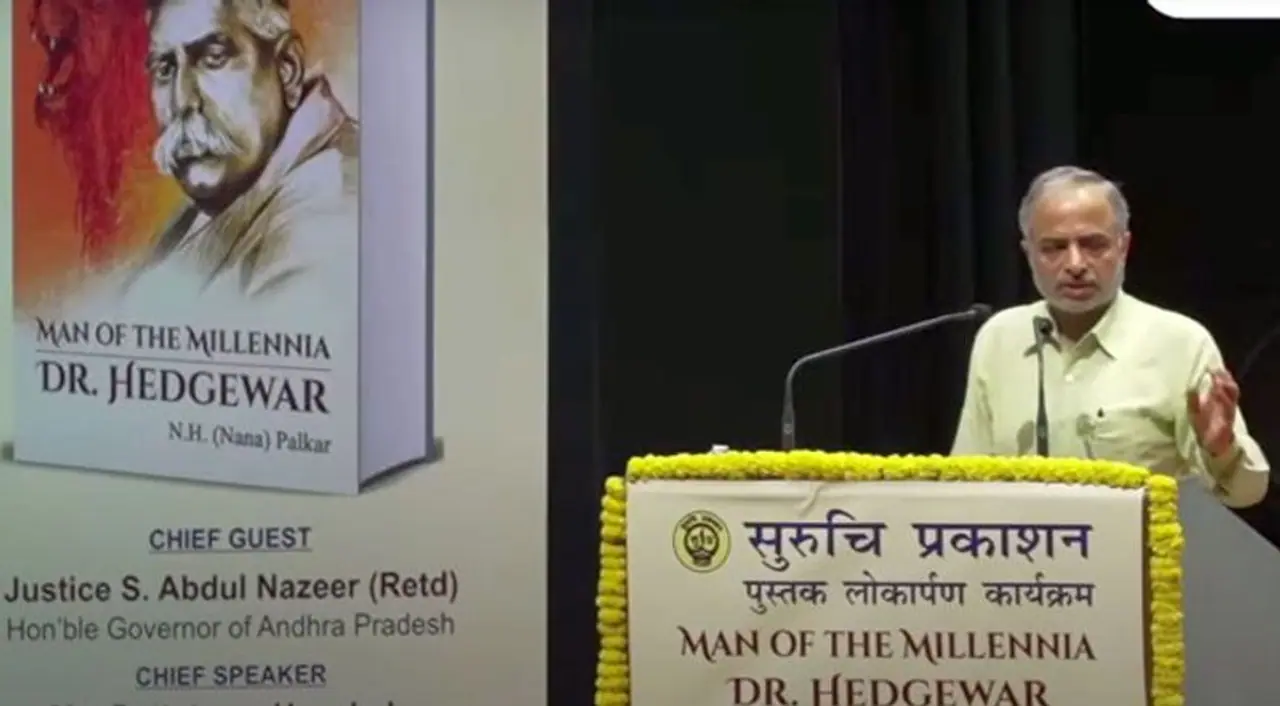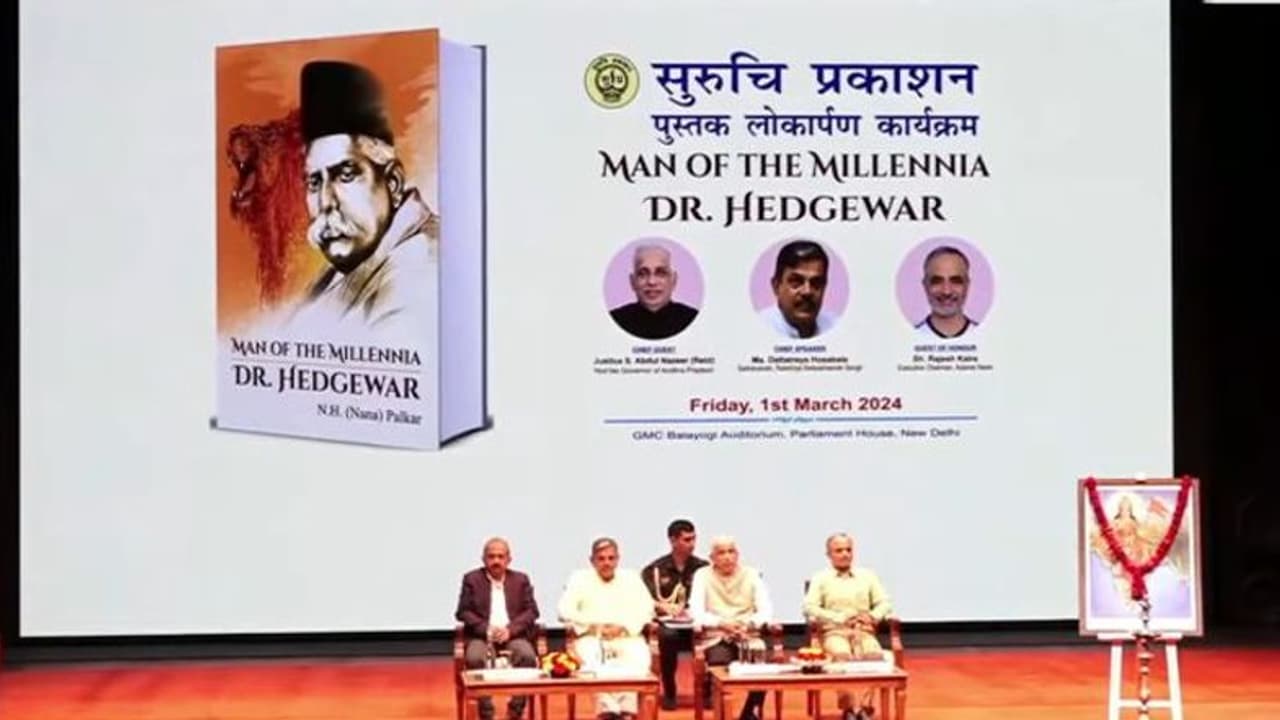Speaking at the event, Asianet News Executive Chairman Rajesh Kalra praised the RSS's character-building initiatives and its role in various societal domains, emphasizing its disciplined approach and significant contributions to nation-building efforts
Rashtriya Swayamsevak Sangh General Secretary Datttreya Hosable on Friday described its founder Dr Keshav Baliram Hedgewar as a 'born patriot' who wholly dedicated his life to the cause of the nation, while highlighting the efforts put in by the RSS during the independence movement. Along with Andhra Pradesh governor Justice (Retd) S Abdul Nazeer and Asianet News Executive Chairman Rajesh Kalra, Dattatreya Hosabale launched a biography on Hedgewar titled "Man of the Millennia -Dr Hedgewar" in English, in Parliament complex. The book has been published by Suruchi Prakashan, which is headed by RSS leader Rajiv Tuli. Late Dr Anil Naine had translated it into English.

Speaking on the occasion, Hosabale shared the journey of the RSS since 1925 – the year of its inception, under Dr Hedgewar. While stating that “one needs to have a heart more than mind to understand the Rashtriya Swayamsevak Sangh", the RSS general secretary said that to understand the organisation you have to understand Dr Hedgewar.
"The feeling of patriotism was innate in him. He dedicated his entire life to the nation. Today's generation takes inspiration from his patriotism and national ideas", he said.
He also said Dr Hedgewar not only went to jail during the freedom movement but when Pandit Nehru declared “Purna Swaraj” at Lahore in 1929 the outfit celebrated with greetings to the Congress in all Sangh shakhas.
Talking about the 1920 Congress Conference, Hosable said: “Dr Hedgewar was a part of the reception committee of the conference. A group called the Nationalist Union was established then. On behalf of the reception committee, the group placed two resolutions -- it was proposed that Congress must declare purna swaraj (complete independence). The second resolution was that India must establish democracy and free the world from the chains of capitalism.”
“He had a global vision that India’s freedom is not merely the liberation of its people but something more,” Hosabale added.
The event chief guest was Andhra Pradesh Governor Justice (Retd) S Abdul Nazeer who said that today the whole world is taking inspiration from the work of the organization which Dr Hedgewar founded.

'Rastra is sarvopari. Nothing is bigger than the nation'
The guest of honour, Asianet News Network Executive Chairman Rajesh Kalra shared his views on one of the world's largest organisations.
“Hedgewarji's contribution to the organisation goes far beyond being its founder alone. His views on how any organisation involved in nation-building must function played a huge role in how it shaped India and its destiny. Discipline is prime to his thinking. He believed that no individual, organisation or nation can be successful without discipline and that has been the cornerstone of RSS’ functioning and it has paid its dividend,” Rajesh Kalra said.
“But before I go ahead let me make one thing very clear -- I am not a “Dikshit” of this organisation and given the audience and most in attendance I am decidedly inadequate to comment on Dr Hedgewar’s life and his achievements. So I am an outsider and yet an admirer and would share my personal opinion this time. I have observed the working of the RSS very closely and in all my dealings with the RSS friends and what comes out is clear that the “Rastra is sarvopari”. Nothing is bigger than the nation,” he said.
“Be it charitra nirman (Character Building), vyakti nirman (Individual Making), samaj nirman (Society Building) or rashtra nirman (Nation Building) RSS has been at the forefront. The organisation has wings that work all in these areas. Given all these, I have often wondered why the narratives being spread for decades about this organisation have been negative. We all know the politics behind such branding and narratives but anyone with a modicum of objectivity can see the positive impact that this organisation has been making for the society for decades,” he added.
“As I said before anything good for the society, good for the nation, be it character building, preservation of culture, national integration, disaster relief efforts, promoting self-reliance, empowering youth and citizens, environment initiatives, promotion of yoga and Ayurveda and so on.. you would find this organisation has played a meaningful role in all these things. Anything related to Bharatiyata, something that is on an ascendancy stage these days you look behind and it is RSS behind it. Just the other day, I was in Mumbai speaking at the Internet and Mobile Association of India annual conference. The topic I was asked to speak about was ‘Science and Soul behind building in the brands’. I made the point that growth in nationalism is a major factor in the growth of the brands and it is hard to guess who and what is behind the sentiments. The role that the organisation plays during the natural calamities is almost legendary. Several of you would remember the devastating Uttarakhand floods of a few years ago when the Central government had asked the Army to help. Having done most of the mountaineering and training in Uttarakhand I was also handing out (let me be very honest) unsolicited advice to a lot of people who were there to help. Among them were several Army officers involved in the rescue operations. One thing I heard each of them whenever they reached the most difficult areas to help – RSS volunteers were already there and they have been working systematically. The hard work had already been done before we stepped in was their common refrain,” he further said.
“Let me share an anecdote that was shared by a friend with me at the National Disaster Management Authority who had gone to Japan to help after the Tsunami there. He said that the thing which was most in demand was drinking water. And as they went door to door in a boat, offering a limited amount of water per person, there were instances which were shocking to them. People were refusing to take water, saying 'we have it please go and give it to somebody else who needs it'. What I am trying to say is that in our nation, half of the response would have been to hold, not to pass it to somebody who actually needs it. And when I think of an organisation that can build our character so that we also behave like the citizens in Japan during a calamity, the organisation that comes to my mind is the RSS,” Rajesh Kalra said.
Sharing his conversations with silent supporters of the RSS from different walks of life, Rajesh Kalra said: “Many of the thoughts and principles about duty and nationhood practised by the RSS are ancient and yet eternal. The narrative and idiom used to convey these thoughts are not always contemporary. In my opinion, there are many in today’s Bharat who would readily accept internalise and practice these timeless principles if they were communicated in a contemporary context. In today’s idiom -- leveraging the power of modern technologies this will accelerate the broader adoption of these principles' integration into our daily lives.
“As I said I am an admirer of the organisation. The admiration has only grown as people wanted to know two characters who are totally different from what had been built into the population for decades. All of these are possible due to ingrained discipline and thanks to its founder.”
